Mount Holyoke alumnae ease end-of-life transitions
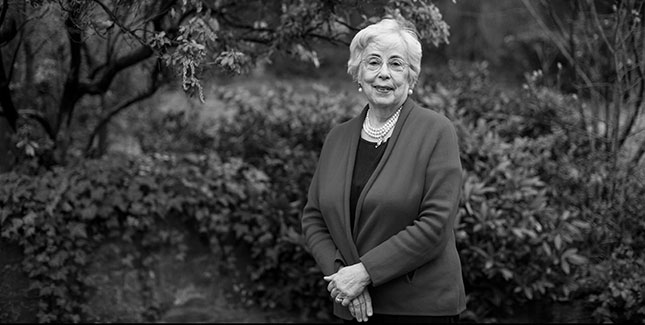
Mona Marich Hanford ’64 wrote a book about coping with the end of life after caring for her husband in the years prior to his death and her subsequent cancer diagnosis. Photo by Erin Schaff
With a new book, Mona Marich Hanford ’64 makes the case for faith in a field where Mount Holyoke alumnae have a legacy of leadership
“Be honest with me,” Mona Marich Hanford ’64 told her oncologist when she learned the bad news. “Don’t give me false hope.”
More than a year later, Hanford has not only held off the deadly cancer she is still fighting, she has also published the book on end-of-life care that she was in the midst of writing when she received her own terminal diagnosis.
“We all have an expiration date,” she says. “And that’s not something Americans talk about.”
She thinks it’s time we did. And there’s a word she wants us to use when we do. That word is “God.”
“There are hundreds of caregiver support groups,” Hanford says, “because families struggle when they have someone with a chronic or terminal illness. But they’re all related to disease. None of them do anything about the next chapter — about ‘do not be afraid.’ We’ve moved God out of the conversation in America.”
By “God,” Hanford doesn’t mean one particular god. She acknowledges that the forms faith can take are a matter of personal belief, and, as such, are vastly diverse.
“I happen to be a Christian,” she says, “because my grandfather was a bishop and priest, but I think God is accessible for everyone. Whether or not you go to church, you are a spiritual person. We all have beliefs and values that connect us to a deeper meaning of life. Some of us have a deep faith in the God of our choosing, be that the Spirit, the Light, a Higher Power or whatever faith gives us hope and peace.”
Hanford’s new book, “The Graceful Exit: 10 Things You Need to Know: Face Reality, Make Wise Choices and Find Hope at the End of Life” — which was on the Washington Post’s Washington Bestsellers List for paperback nonfiction two weeks after its publication in March, where it remained for four weeks — mentions God frequently. But the book also defies easy classification. Don’t expect miracles, Hanford tells her readers. But don’t forsake optimism about what comes next, either.
Hanford is a realist and an optimist and wants to live fully until the end of her life. She was a Russian major at Mount Holyoke. She treasures Dostoevsky, whose words are as applicable today as they were centuries ago when he wrote them:
Death is impossible for us to fathom: it is so immense, so frightening, that we will do almost anything to avoid thinking about it. Society is organized to make death invisible, to keep it several steps removed. That distance may seem necessary for our comfort, but it comes with a terrible price: the illusion of limitless time, and a consequent lack of seriousness about daily life. We are running away from the one reality that faces us all.
“Make sure you or your beloved family member get the best medical care possible, but don’t get caught up in fantasy,” she writes. “Medical science has come a long way, but it has not yet eradicated death or the slow decline imposed by so many diseases. Embrace the elephant in the room, our mortality. It is the first step to a graceful exit.”
Endings are inevitable. What Hanford wants to do, she says, is “shine a little hope forward as people are facing the exit door.” She notes that “there are religious books that talk about God, and death and dying books that talk about dying and palliative care.” But, she says, “There isn’t a book that has wedded those two that I know of.”
Through her writing and speaking, service on the boards of hospice organizations and projects such as The Hope Initiative, a five-part course she created with Reverend Jamie Haith of northern Virginia’s Holy Trinity Church, Hanford wants to help people from all faiths and backgrounds prepare for the spiritual and emotional struggles they may face in confronting questions of life and death. Her ultimate goal is to prevent the fear of death from getting in the way of wise, humane choices.
“We can try and block God’s timeline by hooking our loved ones up to lots of machines,” she said in an interview posted on Harvard University’s website, the Initiative on Health, Religion and Spirituality, “and once a person gets tied up to those machines and they are old, they rarely get untied. The person becomes a prisoner. But it doesn’t have to be like that.”
Hanford isn’t the only Mount Holyoke College alumna who has sought to ease the path for those nearing life’s end. In fact, it’s something of a tradition. Represented most famously by Florence Schorske Wald ’38, the celebrated founder of hospice in the United States, an inspired cohort of Mount Holyoke alumnae have gone on to apply their skills and talents to bringing a measure of peace and comfort to people facing death.
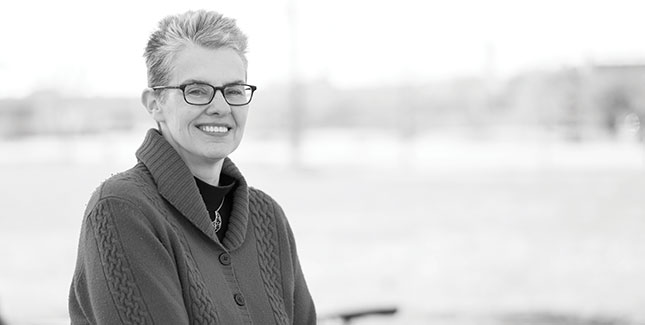
Kathy Brandt ’87, a hospice consultant and expert in palliative care, had the opportunity to meet Florence Schorske Wald ’38 — credited as one of the first advocates for hospice care — at an awards ceremony. Photo by Erin Schaff
“There are all kinds of examples that I could give you of hospice stepping in and transforming the end-of-life experience,” says Kathy Brandt ’87, a hospice consultant and leading expert in palliative care. “Just by being there and listening to the patient’s family and helping them do what they want to make the end-of-life experience as peaceful, as loving, as comfortable as possible. It’s really quite magical.”
Through The KB Group, her Washington, D.C.-based consultancy, and her former work at the National Hospice and Palliative Care Organization, Brandt has raised millions of dollars to increase access to palliative care and hospice and has focused on improving care to veterans, family caregivers, children and underserved populations. She is also writer and editor of the fourth edition of the National Consensus Project’s “Clinical Practice Guidelines for Quality Palliative Care,” which outlines consensus guidelines so that patients with serious illness can access quality palliative care in the U.S.
Brandt met Florence Wald once, and she never forgot it.
“She was getting an award,” Brandt says. “And I worked at the organization and was helping to plan the ceremony where she was going to be recognized, and so I read her bio. And then I went up and said to her, ‘Oh my goodness, we both went to Mount Holyoke!’ We had a nice conversation about how Mount Holyoke had prepared her to be an advocate for people who were having horrible deaths in the hospital cut off from their loved ones — which is how it used to happen before hospice.”
A double-major in politics and women’s studies, Brandt started her own career at the NHO (now known as the National Hospice and Palliative Care Organization) in Alexandria, Virginia. She hadn’t intended to build a profession in the palliative-care field, but she gradually realized that the work she was doing — which included helping programs caring for people with HIV and developing tools to help disenfranchised people access newly introduced Medicare benefits for hospice care — fit perfectly with her training at Mount Holyoke and with what she wanted to do. She kept at it and worked her way up, launching her own company in 2013.
Meeting Wald when she did, Brandt says, gave her a jolt of encouragement.
“I don’t believe Mona or I would have been working on these issues in the same way if it wasn’t for Florence,” Brandt says. “Florence’s work literally changed the way people die in this country — for the better. She really saw it as a calling, and something a lot of folks in hospice — especially the early pioneers — saw, which was that it was a social change movement as much as a health care movement.”
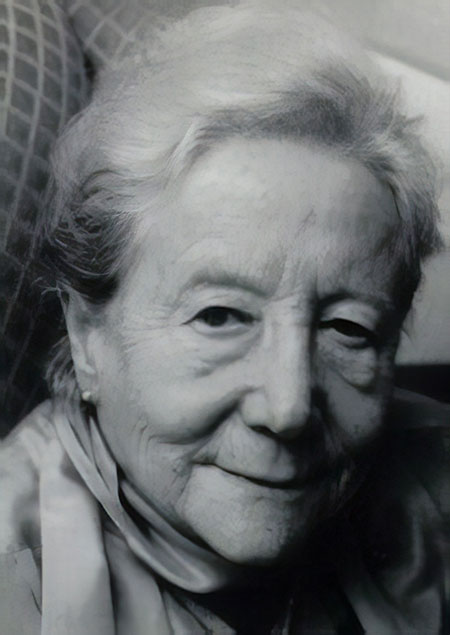
Florence Schorske Wald ’38, one of the first advocates for hospice care in the United States. Photo in public domain
A member of the National Women’s Hall of Fame and an American Academy of Nursing “Living Legend,” Wald, who died in 2008, was herself influenced by the work of public-health nursing pioneer Lillian Wald (no relation) and psychiatrist Elisabeth Kübler-Ross. As a nurse and teacher of nursing at Yale, Florence Wald was drawn more to home care than hospital care, and she encountered a kindred philosophy in a 1963 lecture at Yale by the English physician Cicely Saunders, the founder of hospice in England.
Captivated by what she had heard, Wald resigned as dean of Yale’s nursing school to research palliative-care alternatives for the dying. She subsequently became one of the founders of Connecticut Hospice Inc., now in Branford, Connecticut, which began home care in 1974 and opened an inpatient hospice in 1980. In that role, Wald worked to give the terminally ill the option of spending their last days at home — rather than in the hospital — with caregivers trained to provide a measure of peace, comfort and dignity. According to the most recent figures from the Centers for Disease Control and Prevention, 4,000 hospice programs were operating in the U.S. in 2014, providing care to more than a million patients.
Wald’s work laid the foundation for advocates and caregivers like Hanford and Brandt, and for Shelly Lo ’92, a medical oncologist, hospice and palliative-care physician and associate professor of medicine at Loyola University Chicago Stritch School of Medicine, who decided to pursue science, and eventually medicine, after taking a biology class during her first year in South Hadley.
“I actually entered Mount Holyoke thinking that I was going to be a history major,” Lo says. “It was during my first biology class with [Professor] Rachel Fink that I said, ‘Wow, this is really cool. Biology is really great!’ So, I took another class my second semester with her, and I ended up becoming a biology major.”
Her enthusiasm led her to medical school, and it was during her residency at Albany Medical Center in Albany, New York, that she discovered her interest in palliative care.
“Looking back now,” she says, “I think I chose to become an oncologist because I really liked the palliative-care aspects of oncology.”
It was very rewarding to be able to provide patients with just the basics: a good night’s sleep, getting their pain under control, really essential things that we often take for granted that make a world of difference. That was something positive that I could do as a medical resident.Shelly Lo ’92
Lo is careful to point out that while all end-of-life care is palliative care, not all palliative care is end-of-life care — and also that palliative care isn’t simply about comfort; in some cases, it can make a difference to outcomes. She cites studies showing that for patients with advanced-stage lung cancer, the integration of palliative care at the time of diagnosis not only improves quality of life but can also boost survival rates.
Still, she says, “there is a stigma against palliative care because people do consider it end-of-life care. There is a real fear of dying in this country. For our patients who have cancer, they don’t want to ‘give up.’ Some patients, as well as providers and family members, may see palliative care as giving up. We need to educate patients and providers that all people facing serious illness may benefit from the extra layer of support that palliative care provides.”
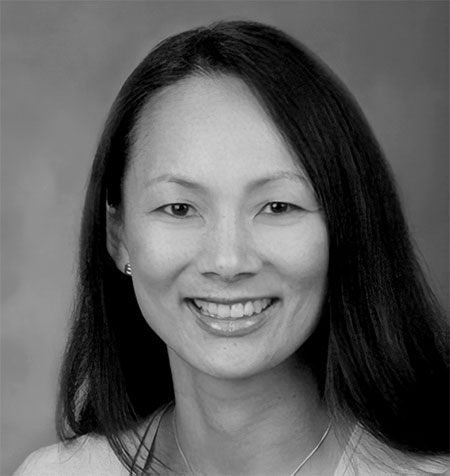
Shelly Lo ’92, a medical oncologist, hospice and palliative-care physician and associate professor of medicine at Loyola University Chicago Stritch School of Medicine. Photo courtesy of Shelly Lo ’92
The idea of death as a failure — for doctors, patients or family members — is an important part of what Hanford hopes her book will change.
In addition to shifting our perception of death as only an ending, she writes, “we need to realize that when we offer our loved one hospice at the end of life, we are doing everything we can. In fact, we are redefining what ‘doing everything’ really is. It’s not trying every invasive medical treatment and being hooked up to machines, it’s being present with our loved ones.”
To Hanford, it is the refusal to consider spiritual possibilities, withholding the comforts of faith when patients are facing death, that is the real failure.
“This is what got me writing the book,” she says. She heard an interview with a hospice chaplain on National Public Radio, “someone paid to wear a collar, who had been trained at Harvard Divinity School, and this person was writing a book, and said, ‘You realize that we, hospice chaplains’ — who are representing God and should be giving us a little hope for the future — ‘can’t use our spiritual tools to help you. We can only use the tools in your toolbox.’ I thought, that’s ludicrous! If you went to a hospital, and you went to a medical doctor, you don’t say ‘Hey, this is what’s wrong with me, and I brought the tools for you to fix it.’”
Hanford’s perspective has been formed, in part, through hard personal experience. She cared for her husband for eight years as he struggled with multiple health issues, an experience that she says sparked her own passionate advocacy around end-of-life issues. He died in their home, under the care of hospice, and her book, which is punctuated by drawings illustrating her points, features photos of him in a comfortable chair in front of a picture window with the family dog. It is a peaceful scene and, to Hanford, it represents what it means to face death surrounded by familiar comforts and loving allies.
This very readable book does an excellent job of “normalizing” a taboo subject in our culture. In sharing her experience with end-of-life issues, Mona speaks to us in her own voice so that by the end of the book we feel as if we have been partners in her journey. Her “God moments” make us reflect on incidents in our own lives that, if we didn’t have a name for them before, we do now.
Barbara Margulies Rossotti ’61, former chair of the Mount Holyoke College Board of Trustees and former board chair of the Washington Home and Community Hospices
For many, she believes, such comforts can mean the difference between choosing a peaceful death and trying to prolong physical life at any cost.
“It occurred to me that one of the reasons people do that is because they don’t have God in their lives,” she says. “They don’t have any place to go. If I were just thinking of the dirt or the furnace, in a columbarium, it would be pretty frightening and I’d hang on to everything too.”
Hanford, who chaired a sold-out 2001 conference at the Washington National Cathedral called Journey of the Soul — Peace at Last, knows she is nearing the end of her own journey. But she is fairly brimming with hope. Her frequent visitors — a friend set up an online signup sheet, which is booked out for a month — leave her Maryland home feeling not sorrowful, she says, but inspired.
“Because there’s no sadness and no silence,” she says. “And I think it’s so refreshing to everybody when I put the elephant on the table and talk about how I’m dealing with it. I’ve demystified the frightening thing. They’re full of hope when they leave.”
Hanford’s goal in “The Graceful Exit” is to nurture such hope by returning faith to the end-of-life conversation — and with that faith, a sense of mystery, curiosity and, importantly, humility.
“I don’t think I have all the answers,” she says. “And that’s why I talk about the possibilities.”
—By Abe Loomis
Abe Loomis is a freelance writer based in western Massachusetts. Contact him at abe.loomis@gmail.com.
This article appeared as “Gifts of the Spirit” in the summer 2018 issue of the Alumnae Quarterly.
August 2, 2018







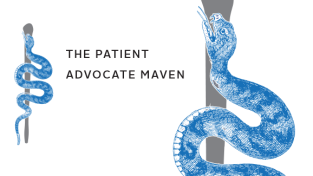

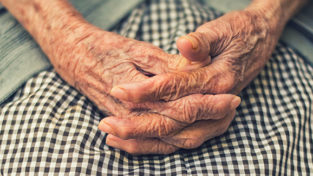
Sadly, Mona passed away on October 26, 2018. Her celebration of life at the church she so profoundly influenced and supported, St. Patrick’s Episcopal in Washington, D.C., was full of her spirit. The congregation was led to the columbarium for internment to the accompaniment of “When the Saints Go Marching In.”
I am encouraged to see MHC recognize such an important and distinguished graduate. Her book is an important read for us all. Many of her comments will stay with you forever.
Thank you, Mount Holyoke, for opening up the subject of death and spirituality!
Talking about death has been taboo. It turns out that it may also be taboo to mention God and spirituality. To address a patient’s beliefs and hopes without judgment opens the door to the possibility of, at the very least, their finding meaning and peace. Mona’s gift is the ability to be fearlessly present with people and their fears and hopes. This is not to offer false hope. It is to assist someone to find their way to their own hope.
What I take from”The Graceful Exit: 10 Things You Need to Know: Face reality, Make Wise Choices and Find Hope at the End of Life” is that dying is a sacred process. That sanctity is often lost as the medical establishment addresses only the physical body and keeping it alive and as loved ones are overwhelmed by helplessness, grief and fear. To recognize the need for hope, as Mona describes, bestows blessing and sanctity on someone’s life as they reach their final days. I believe that the act of listening and allowing the person who is dying to speak of their beliefs (whether or not these include God) and experiences is a profound gift of hope. It is hope because it validates their worth and affirms their dignity. They are seen, heard, and known. Don’t we all hope that our life is/was of value?!
I have had the great pleasure and honor of working with Mona Hanford on the book The Graceful Exit: Ten Things You Need To Know – which is both practical and spiritually uplifting. Mona is a God person who shares her strong, compassionate spirit and her wisdom with everyone she meets. True to her mission to bring Hope to all who are facing death, she has planned a conference “Hope at the End” at The Bible Museum in Washington, D.C. September 29th, 2018. I encourage all who are in need of information about how to plan a graceful exit and who would like spiritual uplift to attend. Speakers include Sister Carol Keegan, President/CEO of the Catholic Health Association; Dr. Jacob Strand, Palliative Care Specialist, The Mayo Clinic, and Fellow, Harvard University; The Rev. Jamie Haith, Lead Pastor of HTC, Holy Trinity Church, McLean, VA; and Dr. Eduardo Bruera, FT McGraw Chair in the Treatment of Cancer, Chair, Department of Palliative, Rehabilitation, & Integrative Medicine at UT MD Anderson Cancer Center.
Mona Hanford has written a very important book for all readers, because we will all inevitably face our own death and almost certainly that of loved ones. Shortly after Mona published her book, my husband suffered severe, irreversible brain damage. Thanks to the many conversations he and I had earlier about what constituted a life worth living, and to the wisdom Mona imparted to me through our friendship and her book, it was not difficult to make the right decisions — to follow what a physician friend called “the only compassionate choice.” My husband passed away peacefully, in the fullest sense of that term. Unlike Mona, I am not a religious person and have my doubts about an afterlife. Nevertheless, I found much to treasure in her book, and would recommend it to any anyone, no matter their beliefs.
Privileged to be a hospice nurse who encountered Mona’s fierce and faithful advocacy for the dying, I celebrate her brilliant witness to the Light. There is freedom in accompanying those who dwell on the margins between life and death. Mona’s own diagnosis has not changed her message ….it has amplified it.
Kudos to you, Mona, and thank you for being a living witness to “God’s” infinite love, during the high points and as time winds down. Your grace filled life, and your tireless efforts to teach and model a “graceful exit,” inspire us at a time when we yearn for truth and meaning in our lives. Thank you for sharing your wisdom and your hope!
great article, great tradition, great book, and Mona a great example
My Mount Holyoke classmate and friend, Mona Hanford, has offered a valuable gift to the 100% of us who will die and most likely will care for someone who is dying along the way. It is the gift of compassionate wisdom so needed in our culture that values individual achievement over community and has become so secularized that God has often been forgotten or is unknown. As an ordained minister I have spent many hours holding dying hands and singing hymns as the end of an earthly pilgrimage approaches. Mona has reminded us that the ultimate comfort is knowing that one is not alone when dying, that God’s love will not only endure but carry us as we make our grace-filled exit. Thank you, Mona!
Great story! Fascinating, too, that God was mentionned in this quite comprehensive survey only once, when Mona spoke. I spoke recently with Mona and asked if there was a way to stimulate palliative care givers to ask participants about the family view/relationship/awareness of God — helping people overcome contemporary avoidance of the realities of God’s presence. She agreed that only when “the elite” seize an overt awareness of God’s presence will there be a cultural change.